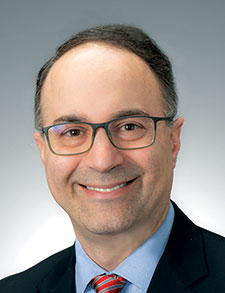
Jeffrey P. Simons, MD, MMM, professor of otolaryngology at the University of Pittsburgh School of Medicine, a full-time pediatric otolaryngologist at UPMC Children’s Hospital of Pittsburgh (CHP), and immediate past coordinator for education for the AAO–HNSF
Jeffrey P. Simons, MD, MMM, professor of otolaryngology at the University of Pittsburgh School of Medicine, a full-time pediatric otolaryngologist at UPMC Children’s Hospital of Pittsburgh (CHP), and immediate past coordinator for education for the AAO–HNSF
Explore This Issue
September 2024ENTtoday: As the incoming CME/education coordinator, what do you hope to achieve during your tenure?
Dr. Simons: As medicine and the current healthcare environment rapidly evolve, it is important that TRIO continues to progress to meet the needs of our members, our patients, and our specialty. There have been significant changes in medical education and the role of both meetings and enduring content over the past several years. The goals and approaches to continuing professional development in otolaryngology will continue to change in the future. As the next CME/education coordinator for TRIO, I plan to embrace these changes and work closely with other Society leaders and staff to develop a strategic plan for the organization’s meetings and overall educational program that aligns with its mission and goals.
The role of live meetings in medical education has evolved over the past several years, and the COVID-19 pandemic catalyzed this evolution. Virtual and online educational experiences now play a much more significant role in otolaryngology education. It is now common to attend committee meetings, conferences, and live webinars from home or the office, without the need for traveling to a meeting, with the associated costs and time away from patient care and from family. These virtual experiences will continue to be a significant part of education and professional interaction in otolaryngology. I plan to explore how TRIO can best take advantage of these virtual experiences to meet the educational needs of our members.
There are, however, many advantages to in-person meetings that cannot be duplicated in the virtual world. We need to make sure to emphasize these aspects of TRIO’s in-person meetings to maintain and expand attendance. For example, there is a substantial benefit to getting away from the distractions of the office and hospital to optimize the educational and conference experience. In addition, many opportunities for hands-on simulation and gamification can only be provided in a live setting. Furthermore, in the virtual world, it is not possible to emulate the camaraderie and interpersonal interactions achieved by bringing people together for an in-person meeting. Such interactions are so important for physician wellness, rejuvenation, and inspiration.
ENTtoday: How will your career and leadership experience benefit the Society?
Dr. Simons: Throughout my career in academic otolaryngology, I have been devoted to patient care, education, research, and service, but a significant amount of my focus has been on otolaryngology education. I am particularly interested in innovation in adult learning, embracing new paradigms for medical education, developing new delivery modalities, and increasing the use of simulation and gamification.
I have been actively involved in otolaryngology education on a national level since I was a resident. I served as chair of the Pediatric Otolaryngology Education Committee and just completed a four-year term as coordinator for education for the AAO–HNSF. In this role, I was responsible for the identification, development, promotion, and evaluation of all educational activities of the organization. I collaborated with seven full-time employees on the education and professional development team at the AAO–HNSF led the Education Steering Committee and oversaw all nine AAO–HNSF education committees, with more than 250 volunteer physician members. Several successful and innovative initiatives were developed by the AAO–HNSF education team under my leadership.
As coordinator for education for the AAO–HNSF, I was very involved with strategic planning related to the future of education and meetings for the organization. I was also very involved with the ACCME accreditation process for the AAO–HNSF and was responsible for ensuring the organization maintained a high-quality educational program that met all the ACCME regulatory standards. Furthermore, I collaborated closely with other leaders in the organization to ensure there was integration and alignment of all of the educational programs, including enduring educational products and education from meetings.
Outside the AAO–HNSF, I have served in several other leadership roles in otolaryngology. I have served as a director at large on the Board of Directors of the American Society of Pediatric Otolaryngology (ASPO), a member of the Education and Curriculum Committee for ASPO, chair of the ASPO Membership Committee, and chair of the executive council for the section of otolaryngology–head and neck surgery for the American Academy of Pediatrics. On a state level, I have been very involved with the Pennsylvania Academy of Otolaryngology-Head and Neck Surgery and am a past president of the organization.
My experiences and background in otolaryngology education have helped provide me with the leadership skills, management experience, enthusiasm, creativity, and vision to be successful as the next CME/education coordinator for TRIO.
ENTtoday: In your opinion, why is the Society important to the fields of otolaryngology, laryngology, and rhinology?
Dr. Simons: Since it was founded in 1895, TRIO has been dedicated to disseminating knowledge and scientific information to otolaryngologists to help encourage discovery and improve patient care. Indeed, for more than 125 years, education has been a core pillar of the organization’s mission. TRIO is devoted to attracting and developing leaders in our field and to inspiring and mentoring the next generation of otolaryngologists. The Society also has the unique ability to bring together physicians in various subspecialties within otolaryngology who share common interests in scholarship, collaboration, and excellence in patient care, education, and research.
Lisa Casinger is the editor of ENTtoday.